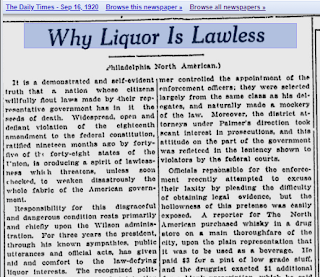 |
| Bad Laws Make Hard Cases... (link) |
SEC. 16. It shall be unlawful to give to any carrier or any officer, agent, or person acting or assuming to act for such carrier an order requiring the delivery to any person of any liquor or package containing liquor consigned to, or purporting or claimed to be consigned to a person, when the purpose of the order is to enable any person not an actual bona fide consignee to obtain such liquor.
SEC. 17. It shall be unlawful to advertise anywhere, or by any means or method, liquor, or the manufacture, sale, keeping for sale or furnishing of the same, or where, how, from whom, or at what price the same may be obtained. No one shall permit any sign or billboard containing such advertisement to remain upon one’s premises.
But nothing herein shall prohibit manufacturers and wholesale druggists holding permits to sell liquor from furnishing price lists, with description of liquor for sale, to persons permitted to purchase liquor, or from advertising alcohol in business publications or trade journals circulating generally among manufacturers of lawful alcoholic perfumes, toilet preparations, flavoring extracts, medicinal preparations, and like articles: Provided, however, That nothing in this Act or in the Act making appropriations for the Post Office Department, approved March 3, 1917 (Thirty-ninth Statutes at Large, Part 1, page 1058, et seq.), shall apply to newspapers published in foreign countries when mailed to this country.
* * *
Section 16 is the return of Republican Party Comstockism.(
link) Puritanical fanaticism enveloped New York in the shape of book-burning societies on the warpath against "articles of immoral use." The Society for the Suppression of Vice actually depicted book-burning and incarceration of non-aggressors as heroic, and
in the financial crash year of 1873 its myrmidons swarmed over any and every word in print that might allow women to exercise choice in matters of pregnancy.(
link) Government control over trade and production had by 1920 again included the posting of letters and shipment of packages, albeit with lesser penalties than ten years on a chain gang. The ban on shipping cases of liquor made the
mailing of envelopes containing barbiturates, morphine and even stimulants much more lucrative. This, like mailing the address of a nearby speakeasy, had
already been banned by the Harrison Act--a law passed largely out of fear that African-americans might be transformed into bulletproof monsters brutally outraging white womanhood.(
link)
Section 17 is another direct assault on the First Amendment: "Congress shall make no law respecting an establishment of religion, or prohibiting the free exercise thereof; or abridging the freedom of speech, or of the press..." This wartime excess repeated Reconstruction-era Comstockist interference with communications and speech, only now with Constitutional sanction. Here is a case of a predatory faction gaining control over the coercive mechanisms of a Political State and then demanding--not earning--obedience, obeisance. Outlawry is a response meaning that the oppressive oligopoly--not the outraged population--is wrong, evil, socially dangerous.
And yet, the explanatory paragraph weakens the censorship somewhat and allows a glimpse behind the mercantilist curtain at the crony alliance paying the pelf and boodling the votes. Censoring foreign newspapers
at a time when American troops struggled under fire from godless communist anarchism in Vladivostok would have been
a bit too obviously the work of a totalitarian planned economy.(
link) Then, too, there were entrenched lobbyists and connected pressure groups to contend with. It would hardly do for the public to realize that the Glucose Trust was the financial backer of dry prohibitionism.(
link) That cartel's legal agenda was opposed most vehemently by brewing and distilling interests which split, then attacked each other like starving curs. Overt marketing of ethanol was thereby torpedoed and the
dry progressive alliance of idealistic socialists and programmable mystical Trilbys--drunk on the power of the Pure Food Law--caused the Panic of 1907. Is it not enough to make you wonder what Machiavellian manipulators owned the Glucose Trust?
* * *
Get the complete story in Prohibition and The Crash on Amazon Kindle in two languages. After this you’ll be able to explain to economists exactly how fanaticism and loss of freedom wrecked the U.S. economy.

Prohibition and The Crash, on Amazon Kindle
Brazilian Sci-fi from 1926 featuring the usual beautiful daughter of a scientist touting prohibition and racial collectivism in America’s Black President 2228 by Monteiro Lobato, translated by J Henry Phillips (link)

I also produce books and articles in Portuguese, using Brazilian historical sources at http://www.expatriotas.blogspot.com or amigra.us
 |
| Clarity isn't oversimplification. |







Comments
Post a Comment